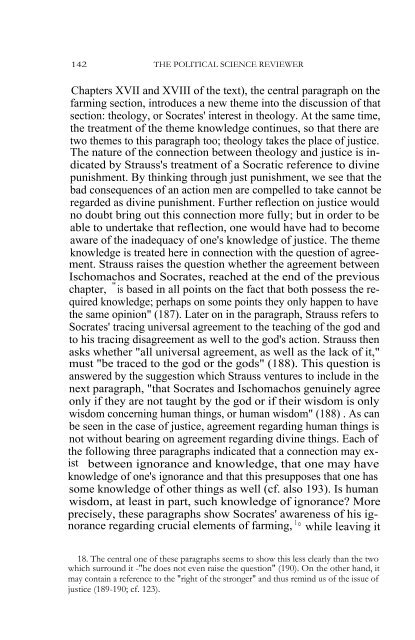Strauss on Xenophon's Socrates Xenophon's Socratic Discourse: An ...
Strauss on Xenophon's Socrates Xenophon's Socratic Discourse: An ...
Strauss on Xenophon's Socrates Xenophon's Socratic Discourse: An ...
You also want an ePaper? Increase the reach of your titles
YUMPU automatically turns print PDFs into web optimized ePapers that Google loves.
142 THE POLITICAL SCIENCE REVIEWER<br />
Chapters XVII and XVIII of the text), the central paragraph <strong>on</strong> the<br />
farming secti<strong>on</strong>, introduces a new theme into the discussi<strong>on</strong> of that<br />
secti<strong>on</strong>: theology, or <strong>Socrates</strong>' interest in theology. At the same time,<br />
the treatment of the theme knowledge c<strong>on</strong>tinues, so that there are<br />
two themes to this paragraph too; theology takes the place of justice.<br />
The nature of the c<strong>on</strong>necti<strong>on</strong> between theology and justice is indicated<br />
by <str<strong>on</strong>g>Strauss</str<strong>on</strong>g>'s treatment of a <strong>Socratic</strong> reference to divine<br />
punishment. By thinking through just punishment, we see that the<br />
bad c<strong>on</strong>sequences of an acti<strong>on</strong> men are compelled to take cannot be<br />
regarded as divine punishment. Further reflecti<strong>on</strong> <strong>on</strong> justice would<br />
no doubt bring out this c<strong>on</strong>necti<strong>on</strong> more fully; but in order to be<br />
able to undertake that reflecti<strong>on</strong>, <strong>on</strong>e would have had to become<br />
aware of the inadequacy of <strong>on</strong>e's knowledge of justice. The theme<br />
knowledge is treated here in c<strong>on</strong>necti<strong>on</strong> with the questi<strong>on</strong> of agreement.<br />
<str<strong>on</strong>g>Strauss</str<strong>on</strong>g> raises the questi<strong>on</strong> whether the agreement between<br />
Ischomachos and <strong>Socrates</strong>, reached at the end of the previous<br />
chapter, " is based in all points <strong>on</strong> the fact that both possess the required<br />
knowledge; perhaps <strong>on</strong> some points they <strong>on</strong>ly happen to have<br />
the same opini<strong>on</strong>" (187). Later <strong>on</strong> in the paragraph, <str<strong>on</strong>g>Strauss</str<strong>on</strong>g> refers to<br />
<strong>Socrates</strong>' tracing universal agreement to the teaching of the god and<br />
to his tracing disagreement as well to the god's acti<strong>on</strong>. <str<strong>on</strong>g>Strauss</str<strong>on</strong>g> then<br />
asks whether "all universal agreement, as well as the lack of it,"<br />
must "be traced to the god or the gods" (188). This questi<strong>on</strong> is<br />
answered by the suggesti<strong>on</strong> which <str<strong>on</strong>g>Strauss</str<strong>on</strong>g> ventures to include in the<br />
next paragraph, "that <strong>Socrates</strong> and Ischomachos genuinely agree<br />
<strong>on</strong>ly if they are not taught by the god or if their wisdom is <strong>on</strong>ly<br />
wisdom c<strong>on</strong>cerning human things, or human wisdom" (188) . As can<br />
be seen in the case of justice, agreement regarding human things is<br />
not without bearing <strong>on</strong> agreement regarding divine things. Each of<br />
the following three paragraphs indicated that a c<strong>on</strong>necti<strong>on</strong> may exist<br />
between ignorance and knowledge, that <strong>on</strong>e may have<br />
knowledge of <strong>on</strong>e's ignorance and that this presupposes that <strong>on</strong>e has<br />
some knowledge of other things as well (cf. also 193). Is human<br />
wisdom, at least in part, such knowledge of ignorance? More<br />
precisely, these paragraphs show <strong>Socrates</strong>' awareness of his ignorance<br />
regarding crucial elements of farming, 1 ° while leaving it<br />
18. The central <strong>on</strong>e of these paragraphs seems to show this less clearly than the two<br />
which surround it -"he does not even raise the questi<strong>on</strong>" (190). On the other hand, it<br />
may c<strong>on</strong>tain a reference to the "right of the str<strong>on</strong>ger" and thus remind us of the issue of<br />
justice (189-190; cf. 123).

















